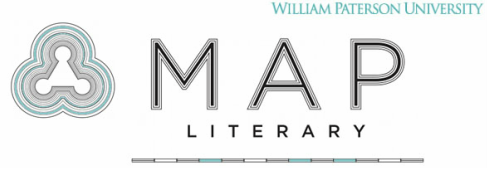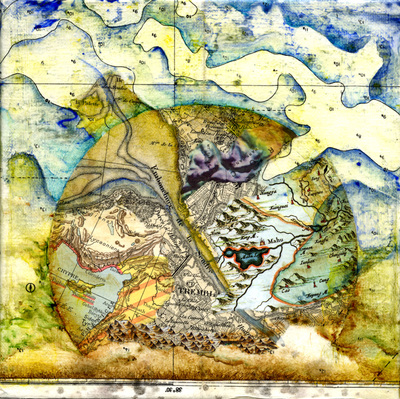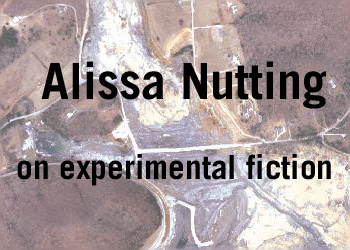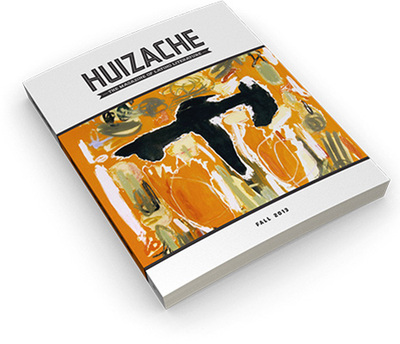REBECCA BERG
My Father's Daughter
1
Three sisters materialize, no one knows how, in a basement. The walls are stone. A deep-set window throws down a patch of moony daylight. The oldest sister is sick. Her skin is sensitive, her eyes limpid. A thick braid curves over one shoulder. She never speaks and can’t go out. What she needs, the second sister decides, is a new suit, a magic suit, that will transform her. The second sister sets out to find the suit. She comes to a bustling city and enters a department store. But she has no money.
2
My father parks his flatbed truck in a muddy field. This, his final stop, is at the dead end of a busy street. His truck is heaped with straw. He works the mud with his hoe while I stand alone on the sidewalk, up the block from the department store. My sister has just been arrested. She was dressed for the city in a blue suit, and this suit, like all her suits, was stolen. When she walked out of the store, a young security guard ran after her calling “Miss, Miss.” His uniform was a t-shirt and cargos, his brow was earnest, and he had a nice head of wavy hair.
I am the third sister. Presumably, my job is now to cure the first sister and free the second. I have some questions:
I am the third sister. Presumably, my job is now to cure the first sister and free the second. I have some questions:
- Does my father realize what my sisters and their dramas are putting me through?
- Could he just focus on me for once?
3
The field is large. Every square foot has been stomped through by soldiers in boots. A world war was fought on this field. My father would need a lifetime to level it.
He puts down his hoe. Cratered ground, when it comes to it, is fine. He can drop a seed in each depression. For that he might have time. Good thing he has his truckload of straw, a blanket to cover the earth with.
“Don’t feel you have to wait,” he murmurs when, out of the corner of his eye, he sees me watching. “I’d like to say I’d do things differently if I had another chance. But my ego might be stronger than my heart.”
He puts down his hoe. Cratered ground, when it comes to it, is fine. He can drop a seed in each depression. For that he might have time. Good thing he has his truckload of straw, a blanket to cover the earth with.
“Don’t feel you have to wait,” he murmurs when, out of the corner of his eye, he sees me watching. “I’d like to say I’d do things differently if I had another chance. But my ego might be stronger than my heart.”
4
I stomp at and miss an ant, a large ant with wings that flies up and bites my face. Green rings circle the torso. The tail is spikey. Provoking it might not be smart. I swat at it anyway. The spike catches me in the thumb. My face begins to tingle. When I touch my cheek, the skin feels like brail. I pick up a wrapper from the sidewalk and wrap it around my thumb, which stings. A boil the size of a marble has bubbled up on the tip, the skin stretched smooth, hard, translucent.
5
I box up my father’s old books—mostly poetry—and take them to the used bookstore.
The owner says, “Corel’s work is always hard to sell.” He puts that book to one side. Silently, he considers another book. He stacks it on top of the first. Book after book goes onto this pile of books he will not take. In the end he agrees to buy one book and pays me two dollars.
What am I going to do with the ones he won’t take? Big square coffee table books, all with glossy white covers. I page through the one by the poet who is hard to sell. He’s an avant-gardist from the seventies. I thought his work would be abstruse. But it consists entirely of little rhyming stanzas dotted around the pages, almost doggerel, about not being able to stay with this wife, either.
The owner says, “Corel’s work is always hard to sell.” He puts that book to one side. Silently, he considers another book. He stacks it on top of the first. Book after book goes onto this pile of books he will not take. In the end he agrees to buy one book and pays me two dollars.
What am I going to do with the ones he won’t take? Big square coffee table books, all with glossy white covers. I page through the one by the poet who is hard to sell. He’s an avant-gardist from the seventies. I thought his work would be abstruse. But it consists entirely of little rhyming stanzas dotted around the pages, almost doggerel, about not being able to stay with this wife, either.
6
In a corner of the field, a rosette of fuzzy leaves has sprouted. It’s the kind of plant that looks cultivated but turns out to be a weed.
“That’s mullein,” an old woman says. She’s been hovering at the edge of the field. Now she bounces over, offering assistance. She’s wearing an embroidered kippah, a coat of many colors, and mismatched socks.
“I suppose you’re right,” I say.
The leaves of the plant go on broadening while she blocks my path. Two more rosettes pop up.
“These days it’s invasive,” she says. “The leaves are soft, though. Back in the dark ages, we used them for toilet paper.”
“That’s mullein,” an old woman says. She’s been hovering at the edge of the field. Now she bounces over, offering assistance. She’s wearing an embroidered kippah, a coat of many colors, and mismatched socks.
“I suppose you’re right,” I say.
The leaves of the plant go on broadening while she blocks my path. Two more rosettes pop up.
“These days it’s invasive,” she says. “The leaves are soft, though. Back in the dark ages, we used them for toilet paper.”
7
To pay for necessities, I take a job as a nanny. The family is outside when I arrive, mother unloading groceries from an SUV, husband and children running around the yard, swinging on fence posts. The yard is beaten dirt. But the house is a mansion made of stone. The mother holds her daughter by the hand while she explains my duties: I will sweep, wash, iron, and mind. Also, she would like me to teach her daughter to play the violin. She herself plays very well, I see, when she pulls a violin from under her arm and performs a concerto. I don’t know how to pay the violin. She might be better equipped, I say, to teach her daughter.
“It wouldn’t be appropriate,” she says. In the meantime she’d like me to please clean the yard. Toys, tents, and tricycles should be stashed in the car. The family will be going on vacation soon.
“It wouldn’t be appropriate,” she says. In the meantime she’d like me to please clean the yard. Toys, tents, and tricycles should be stashed in the car. The family will be going on vacation soon.
8
The floor, the mantelpiece, the woodwork, and the ceiling beams are made of quartered oak. I have dusted and vacuumed. The daughter has had a violin lesson; her brother has taken a bath. The mother sends me into town to buy grass seed and pick up the dry cleaning. “Have a cup of coffee,” she says. “Take ten minutes on us, to meditate.”
In town, I am the only pedestrian. The commercial drag is lined with two-story facades. It’s midday, and the sidewalk glares.
In town, I am the only pedestrian. The commercial drag is lined with two-story facades. It’s midday, and the sidewalk glares.
9
Digging and seeding, I spot a large gray-green rosette growing by the fence at the far end of the yard. Maybe it’s that fuzzy plant that turns out to be a weed. Mullein? Some little ones have sprouted next to it. I guess they’re not my problem. Except—this is the family’s yard, and I work for the family. I pull up several rosettes. The large one has a tall central stalk that sways. There seems to be a weight on the end, a bud. I didn’t know mullein could flower. It almost looks like a poppy bud. Poppies do have fuzzy leaves, especially if they’re fancy poppies.
Not a weed. Put it back, put it back!
I fold the tap root into the hole, tamp the dirt, prop up the stalk with more dirt.
Not a weed. Put it back, put it back!
I fold the tap root into the hole, tamp the dirt, prop up the stalk with more dirt.
10
They’re loading the SUV. Back and forth they bustle, past the drooping poppy. It could recover while they’re away. Or not. If it dies, all they’ll know is it was standing when they left. We haven’t had much rain, I’ll say. Sorry I didn’t think to water.
Finally, they’re gone. I roll up the rugs. I drape the furniture in sheets. I paint walls. While the living room dries, I take some chairs into town for reupholstering.
Finally, they’re gone. I roll up the rugs. I drape the furniture in sheets. I paint walls. While the living room dries, I take some chairs into town for reupholstering.
11
Mid-afternoon, I step into a restaurant. It has black-and-white tiled floors, potted palms, and fluted columns. The space is suffused with sunlight. A voice calls my name; I turn. My father is sitting at a small table near the door, wearing a white union suit.
He is surprised because he thought I wasn’t hungry and never wanted to see him again. I am surprised because I thought he was dead.
“I recommend the Vienna torte,” he says and calls the waiter. I end up with a whipped-cream mustache. He doesn’t eat anything, just drinks coffee and tells me how he landed his new job. His truck was breaking down, barely coughed its way to the repair shop. They put it on a lift to investigate the underside. But they had a run of customers and the technicians wandered off, leaving him in the bay with his truck on a pedestal. Evening fell, the bay doors came down. Eventually he went to sleep. In the morning, they found him in the corner, figured he belonged there, and put him work. Hence the union suit.
I marvel: he wears white to work on cars? There’s not a smudge on him.
“You understand,” he says, “this is all theoretical.”
He’s been sipping the whole time. His coffee cup, I notice, is still full.
“Isn’t that getting cold?” I say.
He asks after Rachael.
“Who?” I say.
He furrows his brow. “Your sister. For God’s sake.”
My oldest sister. I haven’t thought about her in ages. “How should I know? She’s your favorite.”
“I may never see her again,” he says, eyes dewy. He pays for my torte. When he drops a handful of small amethysts and sapphires on the table for a tip, I ask if it’s dark where he lives.
“It’s not something you mind,” he says. “I promise. You’re one with it. What matters is how you picture it. I mean, how you picture it, now. Before you get there.”
“Darkness is all I can picture.”
“Try to remember where you came from. You and your sisters.”
“A basement with stone walls. That’s all I remember. Everything since then feels like it’s been happening inside a cube. Glass walls, but I can’t see out.”
He pauses at the door. He’s shorter than he used to be. His head barely reaches my shoulder.
“The glass cube is probably a delusion,” I continue. “One of these days I’ll step through a wall. But what’s on the other side will be another cube, just another cube, with nothing in it.” I begin to cry. “No light, shit-brown darkness. Dad, I’m scared.”
He has shrunk to the size of a garden gnome. No, a china figurine. His hand, when he touches my shin, feels warm. “You sifted out of the air,” he says. “You and your sisters. I’m telling you, broad daylight.”
He is surprised because he thought I wasn’t hungry and never wanted to see him again. I am surprised because I thought he was dead.
“I recommend the Vienna torte,” he says and calls the waiter. I end up with a whipped-cream mustache. He doesn’t eat anything, just drinks coffee and tells me how he landed his new job. His truck was breaking down, barely coughed its way to the repair shop. They put it on a lift to investigate the underside. But they had a run of customers and the technicians wandered off, leaving him in the bay with his truck on a pedestal. Evening fell, the bay doors came down. Eventually he went to sleep. In the morning, they found him in the corner, figured he belonged there, and put him work. Hence the union suit.
I marvel: he wears white to work on cars? There’s not a smudge on him.
“You understand,” he says, “this is all theoretical.”
He’s been sipping the whole time. His coffee cup, I notice, is still full.
“Isn’t that getting cold?” I say.
He asks after Rachael.
“Who?” I say.
He furrows his brow. “Your sister. For God’s sake.”
My oldest sister. I haven’t thought about her in ages. “How should I know? She’s your favorite.”
“I may never see her again,” he says, eyes dewy. He pays for my torte. When he drops a handful of small amethysts and sapphires on the table for a tip, I ask if it’s dark where he lives.
“It’s not something you mind,” he says. “I promise. You’re one with it. What matters is how you picture it. I mean, how you picture it, now. Before you get there.”
“Darkness is all I can picture.”
“Try to remember where you came from. You and your sisters.”
“A basement with stone walls. That’s all I remember. Everything since then feels like it’s been happening inside a cube. Glass walls, but I can’t see out.”
He pauses at the door. He’s shorter than he used to be. His head barely reaches my shoulder.
“The glass cube is probably a delusion,” I continue. “One of these days I’ll step through a wall. But what’s on the other side will be another cube, just another cube, with nothing in it.” I begin to cry. “No light, shit-brown darkness. Dad, I’m scared.”
He has shrunk to the size of a garden gnome. No, a china figurine. His hand, when he touches my shin, feels warm. “You sifted out of the air,” he says. “You and your sisters. I’m telling you, broad daylight.”
12
The street is tree-lined but not residential. Down some concrete steps, there’s a subway entrance. I pause by the railing and glimpse the area below: tiled walls and a bank of turnstiles. Facing one of the walls is a narrow counter. A young woman with a long, dark braid is standing there, drinking coffee from a to-go cup. She glances up, eyes shiny.
“Rachael?” I say.
No, Rachael would be older, late middle age, older than I am even.
“Excuse me,” I say. “Do you know the way to the botanical gardens?”
She says no in clear, sweet tones and goes back to sipping her coffee. I used to have a voice like that.
“The reason I’m going to the gardens,” I tell her, “is they’re doing an exhibition on mullein.” I’m talking too much. She’s not looking at me now, but I go on: about the uses of mullein throughout the ages, and has she ever been to the gardens? If not, she should check them out, they have a tree garden that’s amazing when in bloom. Eventually, politely, she looks up and thanks me.
That’s when I say I would like to stay in touch. Most people are rock faces, I say. I give and give, and I don’t mind giving, because I like touching all kinds of faces. Textures interest me. But when they’re gone, I don’t miss them. It’s like they never were.
She gazes at a large, framed advertisement on the wall, a picture of a sweating green bottle, and doesn’t answer. Cars zip back and forth. Behind me, a breeze stirs through bushes.
Did you two, it seems to say, ever have anything to say to each other?
“Rachael?” I say.
No, Rachael would be older, late middle age, older than I am even.
“Excuse me,” I say. “Do you know the way to the botanical gardens?”
She says no in clear, sweet tones and goes back to sipping her coffee. I used to have a voice like that.
“The reason I’m going to the gardens,” I tell her, “is they’re doing an exhibition on mullein.” I’m talking too much. She’s not looking at me now, but I go on: about the uses of mullein throughout the ages, and has she ever been to the gardens? If not, she should check them out, they have a tree garden that’s amazing when in bloom. Eventually, politely, she looks up and thanks me.
That’s when I say I would like to stay in touch. Most people are rock faces, I say. I give and give, and I don’t mind giving, because I like touching all kinds of faces. Textures interest me. But when they’re gone, I don’t miss them. It’s like they never were.
She gazes at a large, framed advertisement on the wall, a picture of a sweating green bottle, and doesn’t answer. Cars zip back and forth. Behind me, a breeze stirs through bushes.
Did you two, it seems to say, ever have anything to say to each other?
13
Someone pounds on the family’s front door. Alone inside, I panic. The curtains still need to be washed. I am fighting silverfish and cobwebs. Mice have been nesting in the closets, and the fridge is empty except for some bottles of salad dressing.
No, it’s not the family returning from vacation. It’s my second sister, in a coal-colored suit. Her hair is dove gray.
“I thought they gave you life in prison,” I say.
“I escaped. Hey, it’s nice here.”
She’s on the lam and hasn’t slept in days. Her kidneys, she says, might be failing. People are so closed-minded and suspicious when someone’s in need. When someone needs a place to lay their head, you welcome them into your home. If she had a place, she would do that for anybody.
“It’s not my house,” I say.
“Just let me sit,” she begs. “I haven’t eaten in days.”
I show her into the dining room and bring her a sandwich. The walls are paneled in oak, which I’ve been polishing, and the ceilings are high.
She cries a little. Of the three of us, she thinks, I have done the best for myself. “Listen,” she suddenly says. “I think they let me escape. Because—I might be dying. I won’t be troubling you too much longer.”
“I could lose my job,” I say.
“Just put me in the basement. I don’t mind. All I need is a corner with a roof over it.”
I’ve never gone down there before. It’s paneled in drywall. There’s a wet bar covered with dust. A yoga mat is leaning in the corner. We unroll it, and she collapses on her side, pulling her worldly possessions out of her shirt: a son and a goldfish in a bowl. The child begins to pick at the walls. A patch of drywall breaks off, revealing stone foundations.
“Do you ever get a sense,” I say, “of things impending just out of sight?”
“There’s nobody out there,” she says, looking up at a small slit of a window. Just then we glimpse the tires of the family’s SUV rumbling into the yard.
No, it’s not the family returning from vacation. It’s my second sister, in a coal-colored suit. Her hair is dove gray.
“I thought they gave you life in prison,” I say.
“I escaped. Hey, it’s nice here.”
She’s on the lam and hasn’t slept in days. Her kidneys, she says, might be failing. People are so closed-minded and suspicious when someone’s in need. When someone needs a place to lay their head, you welcome them into your home. If she had a place, she would do that for anybody.
“It’s not my house,” I say.
“Just let me sit,” she begs. “I haven’t eaten in days.”
I show her into the dining room and bring her a sandwich. The walls are paneled in oak, which I’ve been polishing, and the ceilings are high.
She cries a little. Of the three of us, she thinks, I have done the best for myself. “Listen,” she suddenly says. “I think they let me escape. Because—I might be dying. I won’t be troubling you too much longer.”
“I could lose my job,” I say.
“Just put me in the basement. I don’t mind. All I need is a corner with a roof over it.”
I’ve never gone down there before. It’s paneled in drywall. There’s a wet bar covered with dust. A yoga mat is leaning in the corner. We unroll it, and she collapses on her side, pulling her worldly possessions out of her shirt: a son and a goldfish in a bowl. The child begins to pick at the walls. A patch of drywall breaks off, revealing stone foundations.
“Do you ever get a sense,” I say, “of things impending just out of sight?”
“There’s nobody out there,” she says, looking up at a small slit of a window. Just then we glimpse the tires of the family’s SUV rumbling into the yard.
14
“You’re supposed to teach me,” the girl says.
We’re standing on an intricate patterned carpet in the living room. I set a sheet of music on the stand. She plays fast, with fire, and tucks her violin under her arm.
“Now what?” she says.
Why didn’t I read up on violin technique while she was on vacation? “Now,” I say, “we go outside.”
She puts her hand in mine. The yard is dusty. The poppies crumbled long ago, flaking into the dirt, and the sky is cobalt. A few clouds hang in it, and when I look up, a great, lumbering eel-like fish seems to be passing through them. The fish is translucent, its outline intermittent, dissolving into air. Maybe I’m imagining it. No—now the girl is pointing, and there are groups of fish. More and more fish, some shorter, some longer, swimming lower, coming closer. They’ve solidified into color, yellow and a sheeny red. One bumps me, then another. They go on bumping, bumping.
I wrap an arm around the girl. She hides under my jacket. “I don’t want them to eat me,” she says.
“They might just be playing,” I say.
We’re standing on an intricate patterned carpet in the living room. I set a sheet of music on the stand. She plays fast, with fire, and tucks her violin under her arm.
“Now what?” she says.
Why didn’t I read up on violin technique while she was on vacation? “Now,” I say, “we go outside.”
She puts her hand in mine. The yard is dusty. The poppies crumbled long ago, flaking into the dirt, and the sky is cobalt. A few clouds hang in it, and when I look up, a great, lumbering eel-like fish seems to be passing through them. The fish is translucent, its outline intermittent, dissolving into air. Maybe I’m imagining it. No—now the girl is pointing, and there are groups of fish. More and more fish, some shorter, some longer, swimming lower, coming closer. They’ve solidified into color, yellow and a sheeny red. One bumps me, then another. They go on bumping, bumping.
I wrap an arm around the girl. She hides under my jacket. “I don’t want them to eat me,” she says.
“They might just be playing,” I say.
15
I’ve hesitated to take food and water to my sister. It could call attention to her. Now I might be too late. She doesn’t move, her eyes don’t focus, her cheek is cold. The goldfish bowl is empty. I set the plate and glass on the floor beside the yoga mat. On my way up the stairs, I hear a rustle. I turn; her son is squeezing out from under her. He seizes a sandwich, gulps water. Then he sees me watching from the shadows on the stairs. He stuffs the rest of the food into his coat, scales the wall, pushes open the little window, and climbs out.
16
When the mother lays me off, she gives me a month’s wages. “After all, you did work pretty hard,” she says. She adds a tip.
17
In my old age I think about Rachael. Nobody I know ever knew her. I hold her memory inside me and nod when people talk about their children, understanding less and less of what they say. One day, long after I’ve lost track of the years, she materializes beside me. We are descending a spiral staircase. It’s overgrown with greenery. Leafy vines cover the walls, which are mossy. The stone steps are mossy too, slippery. I look up, expecting a stone vault. The ceiling is a blanket of vines, a green translucence. Nausea rises in me at the sight. Then almost-tears. Why? I can’t say; I don’t know.
When the stairs narrow, Rachael drops behind. We come to a window and see nothing but light and air. I complain about the endlessness of this descent. Rachael waits for me to stop talking, eyes lucid. Her skin is as dewy, her hair as thick and untouched by white, as in my earliest memories of her.
“What would it take for you to speak to me?” I ask.
She doesn’t answer. We continue. Step by step, around and down. Occasionally I hear things in the wind, rustling through the vines. She’s the good and the true, it says; without her you’re a lie. Other times I hear: she’s not yours; let her die.
When the stairs narrow, Rachael drops behind. We come to a window and see nothing but light and air. I complain about the endlessness of this descent. Rachael waits for me to stop talking, eyes lucid. Her skin is as dewy, her hair as thick and untouched by white, as in my earliest memories of her.
“What would it take for you to speak to me?” I ask.
She doesn’t answer. We continue. Step by step, around and down. Occasionally I hear things in the wind, rustling through the vines. She’s the good and the true, it says; without her you’re a lie. Other times I hear: she’s not yours; let her die.
Copyright © February 2020 Rebecca Berg

Rebecca Berg works as a cello teacher and a freelance editor, and she is on the faculty of the Lighthouse Writers Workshop in Denver. Her fiction has appeared in various print and online journals. She was the winner of the 2008 Dana Award in the Novel and was the runner up for the 2016 Juniper Prize for Fiction.









